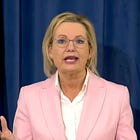Senate Flag Dispute Triggers Clash Between Greens and Nationals
Today’s email is brought to you by Empower your podcasting vision with a suite of creative solutions at your fingertips.

A heated debate over the use of Australia’s national flag in Parliament has reignited political tensions, with Greens Senator Sarah Hanson-Young and Deputy Nationals Leader Kevin Hogan clashing over patriotism, free expression and the symbolism of the flag.
The exchange came after Country Liberal senator Jacinta Nampijinpa Price was asked to remove an Australian flag she draped around her shoulders on Flag Day. Senate President Sue Lines ruled the move breached standing orders against the use of props in the chamber, referring the issue to the Senate Procedures Committee for review.
Speaking on Sky News First Edition, Hanson-Young defended the procedures while expressing discomfort over the flag being used for political stunts.
“Props are against the standing orders, and everyone knows that when you bring a prop in, you risk being told to have it removed,” she said. “The question here is whether the flag itself is a prop. I think there is a question mark over the use of a flag as a prop.”
Standing Orders in Question
The debate will now be formally examined by the Senate Procedures Committee, which Hanson-Young sits on. She said the committee will consider whether national symbols such as the Australian flag or the Aboriginal flag fall under the same rules as other props.
“There are flags already in the chamber,” she said. “It’s the use of it. That’s why it was called to the attention of the President to make a ruling. The President has now referred that to the Procedures Committee. At some point we’ll be discussing that and we’ll come back to it.”
While Hanson-Young acknowledged the national significance of the flag, she said rules in Parliament must be applied consistently.
Truth matters. Quality journalism costs.
Your subscription to Mencari directly funds the investigative reporting our democracy needs. For less than a coffee per week, you enable our journalists to uncover stories that powerful interests would rather keep hidden. There is no corporate influence involved. No compromises. Just honest journalism when we need it most.
Not ready to be paid subscribe, but appreciate the newsletter ? Grab us a beer or snag the exclusive ad spot at the top of next week's newsletter.
Neo-Nazi Use Condemned
Hanson-Young also used the debate to condemn extremist groups who waved the Australian flag at a neo-Nazi rally over the weekend.
“I’ve felt extremely disturbed about this week in relation to the flag — the use of the flag by self-prescribed neo-Nazis,” she said. “That brought shame on our national flag. I’m disgusted and appalled and sadly heartbroken by the use of the flag for hate and division.”
She added that she proudly displays both the Australian and Indigenous flags in her office as symbols of unity. “I think they do represent the unity of this country,” she said.
Disagreement Over Protest Rights
Pressed on whether she condemned pro-Palestinian protesters who burned the Australian flag, Hanson-Young stopped short of outright rejection, citing freedom of political expression.
“The destruction of flags has a long history in political protest,” she said. “The use of political expression is something that is dear to democracy.”
When asked if this was a double standard, Hanson-Young distinguished between burning a flag in protest and extremists co-opting it. “I’m not talking about the destruction of the flag,” she said. “I’m talking about people who wave the flag in the name of neo-Nazi and division in this country. That is un-Australian.”
Nationals Accuse Greens of Anti-Flag Attitude
Hogan, speaking after Hanson-Young, accused the Greens of harboring disdain for the national flag and failing to clearly denounce its burning.
“The fact that Sarah just then couldn’t say, bluntly, the Australian flag should never be burnt, even in a peaceful protest, is not OK,” Hogan said. “What we saw again is from some Green senators who do not like the Australian flag and what it represents. And I think that is a great shame to the Parliament.”
Hogan pointed to past examples, including Greens Leader Adam Bandt’s decision not to stand in front of the Australian flag at a press conference, Senator Mehreen Faruqi wearing a Palestinian keffiyeh in the chamber, and Senator Nick McKim’s comment that he would rather wear the Palestinian flag than the Australian one.
“Many Greens are ashamed of the Australian flag. Shame on them,” Hogan said.
Hanson-Young Pushes Back
Hanson-Young rejected the charge, insisting that her colleagues remained committed to Australian democracy and values.
“I don’t question at all Nick McKim’s patriotism,” she said. “He loves this country. He defends our environment. He defends our right to freedom of expression and democracy, and he’s a good senator for Tasmania.”
She reiterated that her concern was not with the flag itself but with its misuse by extremist groups. “We are not a neo-Nazi nation and we never will be,” she said. “Those neo-Nazis should put down the flag and go home.”
Broader Political Battle
The dispute over flags has tapped into broader cultural and political divisions in Parliament. While Labor has stayed largely on the sidelines of the row, government ministers have sought to distance themselves from the optics of the controversy.
For the Greens, the issue intersects with long-standing debates over Indigenous recognition, cultural identity and freedom of political protest. For the Nationals and other conservatives, it reflects concerns about national pride, loyalty and respect for national symbols.
Hogan said the symbolism was clear: “Senator McKim basically said in the Parliament yesterday that he’d wear the Palestinian flag, not the Australian flag. Adam Bandt wouldn’t stand in front of the Australian flag. That tells you a lot.”
Symbolism of Flags in Parliament
Flags have long carried symbolic weight in Australian politics. In the House of Representatives, Labor MP Gai Brodtmann once wore a dress patterned with the Australian flag, a move that drew little formal objection but highlighted the inconsistent approach to rules on symbols and attire.
Hogan questioned why some displays are tolerated while others are censured. “Is that a prop if we’re not allowed to wear the Australian flag?” he asked.
Hanson-Young said the Procedures Committee will have to draw a clearer line. “It’s the use of it, not the object itself,” she said.
Public Perception and Political Risks
The row has divided opinion outside Parliament as well. National symbols often play into broader debates about multiculturalism, immigration and identity, with political parties wary of being seen as either dismissive of the flag or intolerant of protest rights.
Hogan said Australians expect their leaders to stand by the national flag. “A lot of Green senators do not like Australia or do not like the Australian flag,” he said. “That is a shame to the Parliament.”
Hanson-Young countered that flags represent unity, not division. “We unite under all of them,” she said, referring to the Australian, Indigenous and Torres Strait Islander flags.
Next Steps
The Procedures Committee will now consider whether the flag qualifies as a “prop” under Senate rules. Hanson-Young said she would participate in the discussions and any future recommendations.
“It will be discussed, and we’ll come back to it,” she said. “But we need to apply the rules fairly and consistently.”
The decision could set a precedent for how national symbols are displayed in Parliament, balancing respect for tradition with freedom of expression.
Why It Matters
The dispute underscores how deeply symbols resonate in Australian politics and how debates over national identity can inflame partisan divides.
For some, the flag is an inviolable emblem of unity and sacrifice. For others, its meaning is contested, and its use in political stunts or by extremist groups risks undermining its standing.
As Hanson-Young put it: “That is not who Australia is. We are not a neo-Nazi nation and we never will be.”
And as Hogan countered: “Many Greens are ashamed of the Australian flag. Shame on them.”
Got a News Tip?
Contact our editor via Proton Mail encrypted, X Direct Message, LinkedIn, or email. You can securely message him on Signal by using his username, Miko Santos.
Sustaining Mencari Requires Your Support
Independent journalism costs money. Help us continue delivering in-depth investigations and unfiltered commentary on the world's real stories. Your financial contribution enables thorough investigative work and thoughtful analysis, all supported by a dedicated community committed to accuracy and transparency.
Subscribe today to unlock our full archive of investigative reporting and fearless analysis. Subscribing to independent media outlets represents more than just information consumption—it embodies a commitment to factual reporting.
As well as knowing you’re keeping Mencari (Australia) alive, you’ll also get:
Get breaking news AS IT HAPPENS - Gain instant access to our real-time coverage and analysis when major stories break, keeping you ahead of the curve
Unlock our COMPLETE content library - Enjoy unlimited access to every newsletter, podcast episode, and exclusive archive—all seamlessly available in your favorite podcast apps.
Join the conversation that matters - Be part of our vibrant community with full commenting privileges on all content, directly supporting The Evening Post (Australia)
Catch up on some of Mencari’s recent stories:
It only takes a minute to help us investigate fearlessly and expose lies and wrongdoing to hold power accountable. Thanks!







